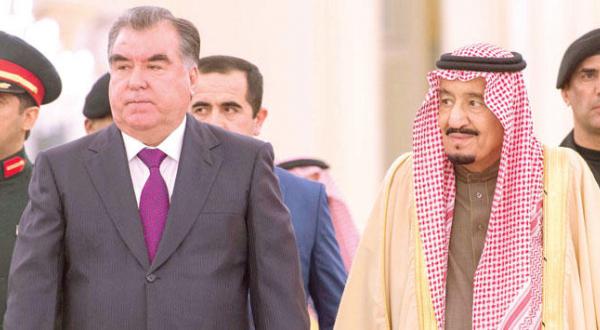
The Custodian of the Two Holy Mosques receiving the President of Tajikistan in Riyadh yesterday (SPA)
The Custodian of the Two Holy Mosques King Salman bin Abdulaziz convened official talks with the Tajik President Emomali Rahmon yesterday at the Al-Yamamah Palace in which they discussed bilateral relations and ways of developing them in addition to recent regional and international circumstances. The summit culminated in 4 agreements and a decree of understanding relating to the fight against crime, science, technology, sports, the youth and education.
President Emomali Rahmon told Asharq Al-Awsat yesterday that his talks with the Custodian of the Two Holy Mosques touched upon strengthening cooperation in the fight against terrorism and the extension of security and safety on a regional and international level.
The Tajik president emphasised the “pivotal” role that Riyadh plays in the region and said that “Saudi Arabia plays a pivotal role due to its remarkable prestige and good reputation in the Islamic world. We welcome the Saudi government’s efforts to achieve the development of Islamic countries economically and socially, and we believe that they represent an effective way to resist recent challenges to security and stability”.
Referring to the fight against terrorism, the Tajik president said that “the whole world faces the dangers of terrorism and extremism” and that the international community is accountable for “taking effective and coordinated steps and launching constructive initiatives” to combat this phenomenon, alluding to the efforts expended by Saudi Arabia in this respect. President Rahmon said that the deterioration of political circumstances in the world and repercussions of the economic crisis hinder the path of development.
President Rahmon also touched upon current conditions in the region and said that the “crises in Yemen and Syria in addition to the Palestinian issue threaten peace, stability and security greatly, and we are aware of the tragic consequences of destabilising security and stability during these civil wars in recent history. We believe that the launch of national dialogue, negotiation and diplomacy in the countries of the region, particularly the Gulf states led by Saudi Arabia, will play an important and constructive role in resolving the crises in the Middle East region”.
